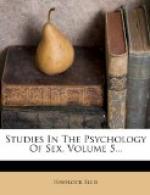It must be added, however, that while the masochist is overcome by sexual rapture, so that he sees nothing disgusting in his act, the medicine-man and the ascetic are not so invariably overcome by religious rapture, and several ascetic writers have referred to the horror and disgust they experienced, at all events at first, in accomplishing such acts, while the medicine-men when novices sometimes find the ordeal too severe and have to abandon their career. Brenier de Montmorand, while remarking, not without some exaggeration, that “the Christian ascetics are almost all eaters of excrement” ("Ascetisme et Mysticisme,” Revue Philosophique, March, 1904, p. 245), quotes the testimonies of Marguerite-Marie and Madame Guyon as to the extreme repugnance which they had to overcome. They were impelled by a merely intellectual symbolism of self-mortification rather than by the profoundly felt emotional symbolism which moves the masochist.
Coprophagic acts, whether under the influences of religious exaltation or of sexual rapture, inevitably excite our disgust. We regard them as almost insane, fortified in that belief by the undoubted fact that coprophagia is not uncommon among the insane. It may, therefore, be proper to point out that it is not so very long since the ingestion of human excrement was carried out by our own forefathers in the most sane and deliberate manner. It was administered by medical practitioners for a great number of ailments, apparently with entirely satisfactory results. Less than two centuries ago, Schurig, who so admirably gathered together and arranged the medical lore of his own and the immediately preceding ages, wrote a very long and detailed chapter, “De Stercoris Humani Usu Medico” (Chylologia, 1725, cap. XIII; in the Paris Journal de Medecine for February 19, 1905, there appeared an article, which I have not seen, entitled “Medicaments oubliees: l’urine et la fiente humaine.”) The classes of cases in which the drug was found beneficial would seem to have been extremely various. It must not be supposed that it was usually ingested in the crude form. A common method was to take the faeces of boys, dry them, mix them with the best honey, and administer an electuary. (At an earlier period such drugs appear to have met with some opposition from the Church, which seems to have seen in them only an application of magic; thus I note that in Burchard’s remarkable Penitential of the fourteenth century, as reproduced by Wasserschleben, 40 days’ penance is prescribed for the use of human urine or excrement as a medicine. Wasserschleben Die Bussordnungen der Abendlaendlichen Kirche, p. 651.)
The urolagnia of masochism is not a simple phenomenon; it embodies a double symbolism: on the one hand a symbolism of self-abnegation, such as the ascetic feels, on the other hand a symbolism of transferred sexual emotion. Krafft-Ebing was disposed to regard all cases in which a scatalogical sexual attraction




